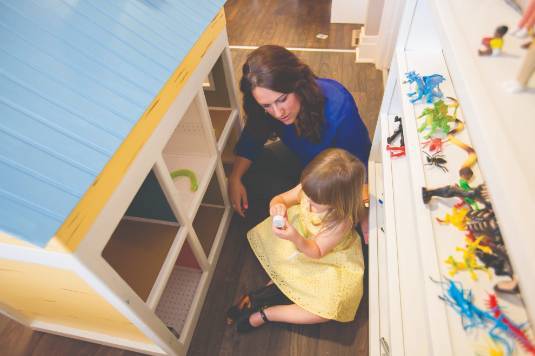Lipscomb makes national mark in counseling, play therapy
Janel Shoun-Smith |
Federal grant funds suicide prevention, international credential recognizes quality of play therapy program
Lipscomb University has made two strides onto the national stage this semester in the areas of student mental health counseling and academic programs in play therapy, a technique used by therapists to work with children.
The University Counseling Center was recently awarded a Garrett Lee Smith Campus Suicide Prevention Grant, a federal grant awarded to 22 universities across the nation this year by the Substance Abuse and Mental Health Services Administration.
Lipscomb has been approved as the first Center of Play Therapy Education in the state and one of only 30 such centers in the world.
Both the University Counseling Center and the play therapy program are operated by the Department of Psychology, Counseling and Family Science in the College of Liberal Arts & Sciences.
"I am proud of the hard work that Denis' Thomas and our counseling center staff put into these two important accomplishments. It is an important part of our departmental mission to make positive impact through the work we do, and both of these achievements provide new avenues to do that," said Department Chair Shanna Ray.
New Funding for Suicide Prevention Programs
The $228,000 Campus Suicide Prevention Grant is matched with university funds, providing enough financial support to allow the counseling center’s assistant director to spend half her time focusing on prevention programs and opening up funds to hire a new on-campus counselor, much needed as the center’s student clientele has more than tripled in the past two years.
So far this school year, the counseling center is logging more than 200 patients a week, which doesn’t leave much time for prevention.
“This grant really helps free up time and money to focus on prevention and over three years’ time, to build a foundation that we can use throughout the future to prepare our students each year,” said Frank Scott, director of the counseling center.
The Campus Suicide Prevention Grants were established in 2004 by President George W. Bush in the nation’s first youth suicide prevention bill.
Lipscomb will use the grant to increase the counseling center’s social media presence and explore ways to more effectively use online resources to reach students, said Andrea Mills, assistant director of the counseling center.
The center will also conduct a nationally used suicide prevention education program called Question Persuade Refer for all incoming freshmen beginning the 2016-2017 school year. The program certifies participants as “gatekeepers,” trained to recognize the signs of someone contemplating suicide.
Counseling officials have already held prevention trainings for Lipscomb’s resident assistants (RAs) and a sexual assault awareness and prevention workshop with Lipscomb’s female student athletes.
“This grant allows us to educate on much more than simply informing students of the signs of suicide. It includes any kind of mental health issue among a population considered at risk,” said Mills. “So we are working with any student population that may be marginalized.”
In the past two years, Nashville colleges have experienced several student suicides, including Lipscomb’s first on-campus suicide in decades in fall 2013.
“The campus community came together in a strong way to openly discuss mental health with the student body and to offer a variety of public and private sessions to help students, faculty and staff deal with the event and its aftermath,” Mills said. “Lipscomb’s counseling center led these initiatives with strong support and direction from the university administration.”
Those events resulted in a spike in students seeking on-campus counseling services that has not abated even two years later.
“The counseling center has made it a priority to focus on building capacity to deal with crisis as well as empowering the campus at large with the infrastructure necessary to implement a suicide prevention plan and sustain that plan throughout the coming years.”
Center for Play Therapy Education
This semester the play therapy program was approved by the Association for Play Therapy. This credential allows Lipscomb to offer continuing education credits to play therapy professionals and recognizes the quality of training provided to students, said Denis Thomas, assistant professor in psychology and the co-director of the play therapy program.
“As Lipscomb is the only approved center in the state and one of only seven in the Southeast, this will make a big difference in Nashville’s counseling community,” Thomas said.
Play therapy is a technique used by family therapists and mental health counselors to enhance development and work through emotional issues in children.
In order to be approved as a center, Thomas had to describe its ongoing efforts to conduct research, provide clinical training, operate a play therapy lab and offer continuing education. The play therapy program is a specialty offered in either the graduate mental health counseling or marriage and family therapy master’s programs.
Thomas and co-director Paris Goodyear Brown, a registered play therapy supervisor based in Franklin, Tenn., hold an annual conference for local professionals and oversee students’ internships in play therapy. In addition, the Lipscomb Family Therapy Center’s play therapy lab, opened on campus this past spring.
Future plans are to begin a lunch and learn series for local professionals and students, to begin offering continuing education credits and possibly supervisor trainings at the spring training conference.
Twenty students are enrolled in advanced play therapy and as of December 2015, 23 graduate students will have graduated with training in play therapy.
